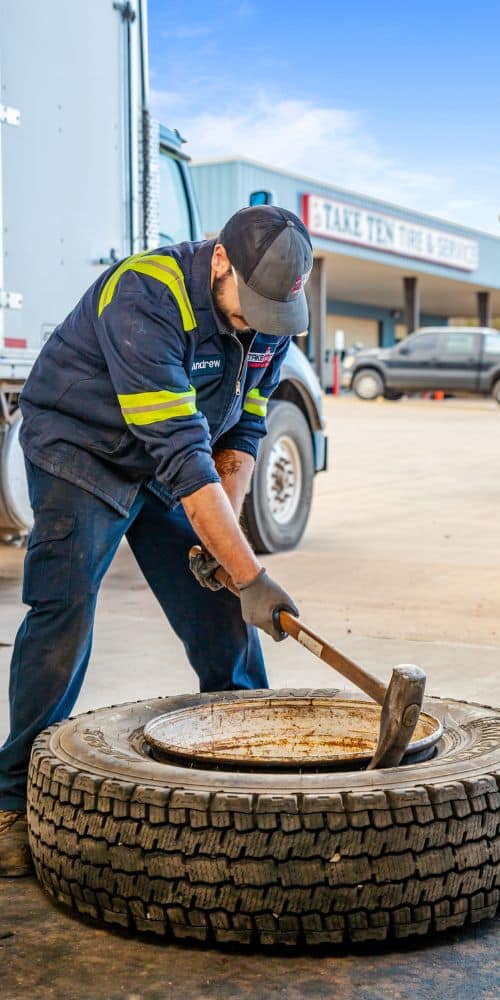Morris Tires: Your Location for GMC Tires Service Excellence
Morris Tires: Your Location for GMC Tires Service Excellence
Blog Article
Tire Service: The Effect of Weather
When it comes to making sure optimal performance and safety on the road, recognizing the impact of climate conditions on tire solution is important. GMC Tire Service. In this conversation, we will explore the complex relationship between climate problems and tire solution, dropping light on the significance of weather-specific tire maintenance techniques and considerations.
Warm and Tire Performance
When exposed to high temperatures, tires experience modifications in performance that can dramatically affect lorry safety and security and handling. The warmth generated from long term driving or hot weather problems causes the tire rubber to soften, causing lowered tread life and raised wear. As the rubber ends up being softer, the tire's grip when traveling reduces, impacting stopping distances and general grip. In extreme situations, excessive heat can also trigger tire blowouts, posturing a severe safety and security danger to the automobile and its occupants.

Winter Effects
Cold climate conditions can have a substantial impact on tire efficiency and safety and security. In cool weather, tires might likewise lose air pressure much more swiftly, which can affect handling and gas efficiency.
To reduce the results of winter on tires, it is vital to regularly examine tire pressure and inflate them to the supplier's recommended degrees. Utilizing winter months or all-season tires created for chilly climate problems can additionally improve traction and grasp on icy or snowy roads. Appropriate tire upkeep, consisting of normal assessments for wear and damage, ends up being also extra vital during colder months to make certain ideal efficiency and security.
Rainy Issues Impact
Tires with worn-out footsteps are a lot more vulnerable to hydroplaning, where a layer of water builds up in between the road and the tire surface area, leading to loss of traction. To combat this, vehicle drivers need to frequently examine their tires for appropriate tread depth and consider investing in tires particularly designed for damp conditions.
In addition, rainy weather can likewise decrease visibility, making it testing for motorists to see the road ahead plainly (GMC Tire Service). In such problems, it is important to change driving rates as necessary and preserve a safe complying with distance to allow for unexpected quits. Correctly inflated tires can also aid in preserving control on wet roads by supplying much better handling and grasp
Snow and Tire Security
Snow-covered roads present distinct difficulties for drivers, stressing the value of appropriate tire selection and maintenance. When driving in snowy problems, having the best tires can make a considerable difference in security and performance. Wintertime tires are designed with special rubber compounds and walk patterns to provide much better grip on snow and ice contrasted to all-season tires. The deeper footsteps and sipes of winter tires aid grip the road better, lowering the danger of sliding and moving.

It is crucial to comply with supplier instructions when mounting and using tire chains to protect against damage to the tires and automobile. By picking the ideal tires, keeping appropriate rising cost of living, and considering extra grip help like tire chains, chauffeurs can enhance their security when navigating snow-covered roads.
Weather-Related Tire Upkeep
When encountered with numerous weather, proper tire maintenance becomes a crucial element of car safety and performance. Weather-related tire maintenance incorporates a variety of methods aimed at making certain optimal tire feature and longevity in various weather condition circumstances. One essential element of you can check here weather-related tire maintenance is tire stress regulation. Varying temperature levels can cause tire stress to vary, impacting traction and fuel efficiency. Consistently examining and readjusting tire stress according to supplier referrals is vital for safe driving in altering climate condition. Furthermore, tire walk depth plays a substantial role in handling different weather components. Tires with sufficient walk deepness provide better grasp on wet or icy roads, minimizing the threat of skidding or hydroplaning. Evaluating tire website link tread frequently and changing tires when walk wear gets to a specific deepness is crucial for keeping grip and security in adverse climate. By focusing on weather-related tire upkeep, vehicle drivers can enhance safety and security, boost car performance, and lengthen the lifespan of their tires.
Verdict
In conclusion, weather condition problems have a significant impact on tire efficiency and safety and security. From warmth affecting tire stress and put on to cold weather condition minimizing traction, it is essential to consider the weather condition when preserving and making use of tires.
In this conversation, we will explore the complex connection between climate problems and tire solution, losing light on the relevance of weather-specific tire maintenance practices and factors to consider.

Report this page